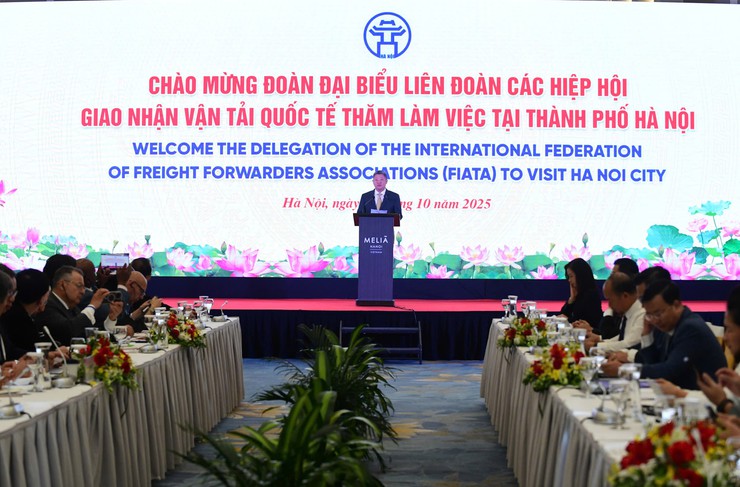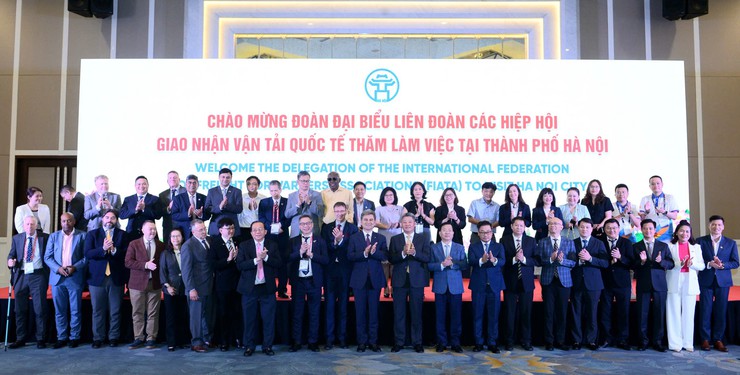The meeting was attended by Deputy Director General of the Import-Export Department under the Ministry of Industry and Trade Tran Thanh Hai, Chairman of the Vietnam Logistics Business Association (VLA) Dao Trong Khoa, and representatives of Hanoi's relevant departments and agencies.

Overview of the event.
The FIATA delegation was led by its President, Turgut Erkeskin, along with members of the organization's executive board.
In his opening remarks, Vice Chairman Nguyen Manh Quyen said logistics is a key service sector that enhances economic connectivity and competitiveness, and one of four strategic service industries prioritized for development through 2050, alongside tourism, information and communications technology, and financial services.
Developing logistics infrastructure, he emphasized, is a strategic breakthrough in line with the Government's orientation to make logistics one of the four leading service industries driving national growth.
Hanoi is being developed as a strategic logistics and trade hub for the midlands and northern mountainous regions, serving as a bridge connecting sub-regions with the Red River Delta and key seaports, especially along major economic corridors with China, ASEAN, and the East–West Economic Corridor.
Vice Chairman Quyen reviewed Hanoi's notable progress in logistics development. The city has built a relatively complete logistics infrastructure network that includes inland ports, logistics centers, bonded warehouses, and inter-regional transport routes, strengthening its role as a major supply hub.
Logistics services have grown rapidly, with many enterprises investing in modern facilities, adopting advanced technologies, and expanding into global value chains through e-commerce and digital platforms.
He affirmed Hanoi's goal to develop a high-quality, modern, and efficient logistics system driven by technological innovation, adding that international experience will be essential in shaping a long-term strategic framework for the sector.
Vice Chairman Quyen invited FIATA and VLA to propose solutions to help Hanoi accelerate the development of a sustainable and competitive logistics system, especially amid fast technological change and global uncertainty.

Delegates at the event.
Expressing his gratitude for the warm welcome, FIATA President Turgut Erkeskin praised the dynamism and strong logistics potential of Vietnam, particularly Hanoi, where logistics plays a vital role in facilitating trade and strengthening business linkages across supply chains.
He emphasized that logistics is a fundamental pillar of the economy and that without an efficient logistics network, economic activity would face major disruptions both in Vietnam and globally. He reaffirmed FIATA's readiness to cooperate closely with Hanoi and Vietnam, describing the federation as an important platform for implementing effective logistics solutions.
President Erkeskin highlighted the critical role of digitalization in transforming logistics and noted that FIATA's digital systems and solutions can help Vietnam integrate more deeply into the global logistics network. He expressed confidence that the meeting would pave the way for productive cooperation and contribute to sustainable logistics development in Hanoi and across Vietnam.
During the discussion, representatives from central ministries and Hanoi authorities shared recommendations and proposed measures to enhance logistics operations in the city. VLA Chairman Dao Trong Khoa affirmed VLA's commitment to support Hanoi in developing a comprehensive logistics master plan, in close coordination with FIATA and international experts.
Deputy Director General of the Import-Export Department Tran Thanh Hai stated that the Ministry of Industry and Trade is drafting Vietnam's Logistics Service Development Strategy for 2025–2035, with a vision toward 2045, to create a synchronized and competitive national logistics sector aligned with Vietnam's economic potential.
He noted that Hanoi, as a major metropolis with a dense population and distinctive urban logistics characteristics, should play a leading role in implementing this strategy and will benefit from the technical support of international partners like FIATA.
"Hanoi's logistics sector will serve as a driving force linking northern Vietnam with Southeast Asia, contributing not only to Vietnam's logistics growth but also to the overall development of the region. We hope Hanoi will attract leading logistics enterprises and evolve into the central logistics coordination hub of northern Vietnam," said Hai.